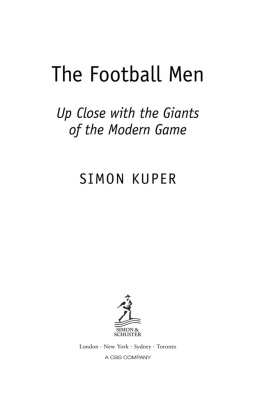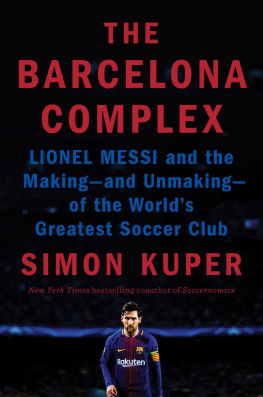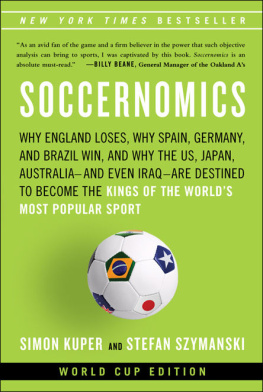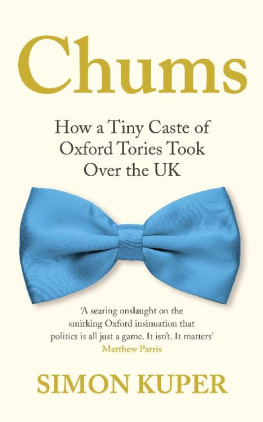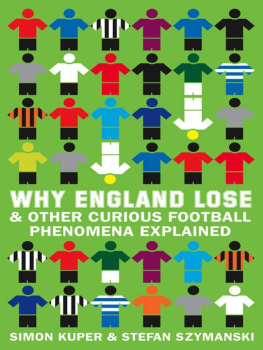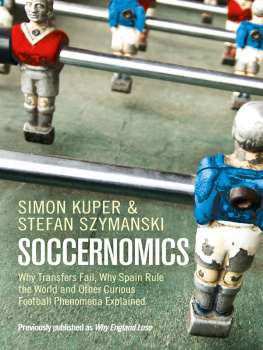Simon Kuper - The Football Men: Up Close with the Giants of the Modern Game
Here you can read online Simon Kuper - The Football Men: Up Close with the Giants of the Modern Game full text of the book (entire story) in english for free. Download pdf and epub, get meaning, cover and reviews about this ebook. year: 2011, publisher: Simon & Schuster Ltd, genre: Detective and thriller. Description of the work, (preface) as well as reviews are available. Best literature library LitArk.com created for fans of good reading and offers a wide selection of genres:
Romance novel
Science fiction
Adventure
Detective
Science
History
Home and family
Prose
Art
Politics
Computer
Non-fiction
Religion
Business
Children
Humor
Choose a favorite category and find really read worthwhile books. Enjoy immersion in the world of imagination, feel the emotions of the characters or learn something new for yourself, make an fascinating discovery.
- Book:The Football Men: Up Close with the Giants of the Modern Game
- Author:
- Publisher:Simon & Schuster Ltd
- Genre:
- Year:2011
- Rating:5 / 5
- Favourites:Add to favourites
- Your mark:
- 100
- 1
- 2
- 3
- 4
- 5
The Football Men: Up Close with the Giants of the Modern Game: summary, description and annotation
We offer to read an annotation, description, summary or preface (depends on what the author of the book "The Football Men: Up Close with the Giants of the Modern Game" wrote himself). If you haven't found the necessary information about the book — write in the comments, we will try to find it.
The Football Men: Up Close with the Giants of the Modern Game — read online for free the complete book (whole text) full work
Below is the text of the book, divided by pages. System saving the place of the last page read, allows you to conveniently read the book "The Football Men: Up Close with the Giants of the Modern Game" online for free, without having to search again every time where you left off. Put a bookmark, and you can go to the page where you finished reading at any time.
Font size:
Interval:
Bookmark:


First published in Great Britain in 2011 by Simon & Schuster UK Ltd
A CBS COMPANY
Copyright 2011 by Simon Kuper
This book is copyright under the Berne Convention.
No reproduction without permission.
All rights reserved.
The right of Simon Kuper to be identified as the author of this work has been asserted by him in accordance with sections 77 and 78 of the Copyright, Designs and Patents Act, 1988.
Simon & Schuster UK Ltd
1st Floor
222 Grays Inn Road
London
WC1X 8HB
www.simonandschuster.co.uk
Simon & Schuster Australia
Sydney
A CIP catalogue for this book
is available from the British Library.
ISBN: 978-0-85720-160-7
eBook ISBN: 978-0-85720-161-4
Typeset by M Rules
Printed in the UK by CPI Mackays, Chatham ME5 8TD
To my father, who suggested the idea for this book, as he did for so many of my projects; to Pamela, for tolerating me while I wrote it; and to Leila, Leo and Joey, who I hope will read it one day.
In his book The Football Man , published in 1968, Arthur Hopcraft marvels at the fame of footballers. Say the word Georgie in Manchester, Hopcraft writes, or in close proximity to some kind of football activity in any other British town, and everyone will know at once that you are talking about Best. If you say Matt, they think Busby. Denis evokes Law, Nobby means Stiles, and so on. Hopcraft explains this not by the fanaticism of football following but by the deep and lasting impact made by men of extraordinary personality in the context of sport.
Hopcraft began covering football at the age of sixteen. Michael Parkinson, an early colleague at a local paper in Barnsley, remembers him as the first reporter I had encountered who wore a bow tie, which took courage in Barnsley in the 1950s. Later Hopcraft became a well-known writer for television: he did the famous adaptation of John Le Carrs Tinker, Tailor, Soldier, Spy in 1979. But before abandoning football he packaged much of his best work in The Football Man , and its that book that made me decide to write this one.
In his book, Hopcraft anatomises English football of the time in a series of profiles: The Player, The Manager, The Director, The Referee, The Fan (mostly about hooligans) and so on. He meets and describes George Best, Alf Ramsey, a young Ken Bates (then chairman of Oldham) and many others. He takes them seriously, not as demigods but as people and craftsmen. His overly polished prose is now a bit dated, and we no longer need his assurances that football is important enough to write about (we now often need to be told that it isnt). Still, The Football Man is a wonderful book, and prescient in places. Hopcraft tells us that, contrary to what many people think, a European Super League will never happen, but he adds:
... a more likely suggestion is that a domestic Premier League may hive off from the English Football League to confine top-quality football to perhaps a dozen of the countrys major areas of population. This is a perfectly rational idea, and one which is known to find favour among a number of men in influential positions in football.
I would never dare compare myself to Hopcraft, and I dont wear bow ties, but men of extraordinary personality still make an extraordinary impact in the context of sport, and in The Football Men I give my take on the football men of our day. I have done my best to understand what they are like, not as demigods but as people and craftsmen.
Like Hopcraft, I began writing about football at the age of sixteen: a profile of Ruud Gullit, published in World Soccer magazine in October 1986, for which I think I was paid 30, a lot of money to me then. (Ill come clean straight away and say that a lot of the profiles in this book are of Dutchmen. Just be thankful I didnt grow up in San Marino.) Ive been profiling footballers, and managers, and directors, and sometimes even fans ever since. I joined the Financial Times in 1994, and am there again today, but in between Ive had stints at the Observer (one of Hopcrafts old papers) and The Times . I have also written for innumerable magazines and papers from Japan (good pay) to Argentina (not so good).
I have never thought that most footballers have anything special to say. I know a colleague who believes that only by speaking to a real footballer can you access truths about the game. This man is forever texting players, and saying things like, If you speak to Franz Beckenbauer, hell tell you that...
I reject that idea. I do believe that you can access truths about the game by speaking to Arsne Wenger, if he feels like telling you. I dont believe you can access them by speaking to Wayne Rooney.
In fact, now that Ive reached middle age Ive increasingly given up chasing interviews with footballers. It isnt worth the humiliation. Sometimes a magazine will call, and ask, Can you get an interview with X? I always say that you can: if you want to spend weeks sending faxes that somehow never arrive, phoning impatient agents on their mobiles, hanging around training grounds and trading favours with boot sponsors. In the end youll get an interview with X. Hell probably turn up hours late, say, I hope well win on Saturday. I think we can, and then drive off again.
Another colleague of mine describes acting as an interpreter for a star who had just joined Real Madrid. As the two of them sat in the car heading for the press conference where the star was to be presented, my colleague asked him what message he wanted to convey to the waiting media. The star looked surprised at the thought. The aim, he explained, is to say nothing.
Footballers almost never say No comment. As Gazza once pointed out, if you do that, the newspaper will report that the player said, No comment, which makes him look suspicious. Instead the player says sweet nothings. I live in Paris, and the other month I caught Franck Ribry being interviewed on French TV. It was impressive to see how fluently the phrases rolled out: We played well... Another big game coming... Lets hope we can win... Only the team performance matters... In its way, it was a perfect performance. This kind of drivel often satisfies interviewers, too. Many newspapers and TV channels barely worry about the content. What they are trying to show is access to footballers or the appearance of access. That by itself is enough to sell. I think I sold my interview with Kak to publications in eight countries.
Of course sometimes you catch a footballer on a good day, often after he has retired, and then the interview is a pleasure. I felt that in some of the profiles in this book: going around Cape Town with Bruce Grobbelaar, around Rotterdam with Johnny Rep and Bernd Hlzenbein, or sitting in the Polo Bar in Ascot with Glenn Hoddle. Footballers tend not to respond well to abstract questions about emotions (How did you feel when...) but if you ask about specific moments or places or people, they sometimes get going. Even interviewing active footballers can be worthwhile. These people are roaring with energy, almost never have low blood sugar or a hangover, and are fascinated by what they do. Nicolas Anelka and Rivaldo werent pleased to see me, but they did say interesting things.
Then there is the intangible sense of a person that you can only get from actually meeting him: his aura, if you like. Once in the Nou Camp someone introduced me to a bandana-wearing Ronaldinho. While we exchanged pleasantries, I had nearly a minute to take him in from point-blank range. As he stood there, his legs were constantly in motion. He was bouncing, almost dancing on the spot. He also couldnt stop looking around. This may just have been desperation to escape a British geek, but I risked an instant psychiatric diagnosis: attention deficit disorder.
Next pageFont size:
Interval:
Bookmark:
Similar books «The Football Men: Up Close with the Giants of the Modern Game»
Look at similar books to The Football Men: Up Close with the Giants of the Modern Game. We have selected literature similar in name and meaning in the hope of providing readers with more options to find new, interesting, not yet read works.
Discussion, reviews of the book The Football Men: Up Close with the Giants of the Modern Game and just readers' own opinions. Leave your comments, write what you think about the work, its meaning or the main characters. Specify what exactly you liked and what you didn't like, and why you think so.

